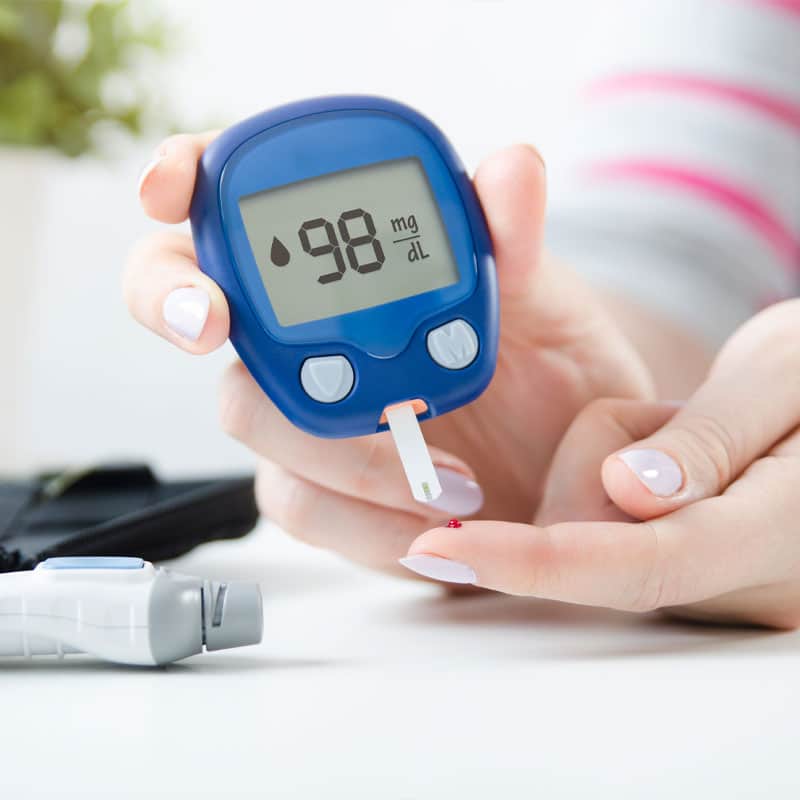index
The term cortisol has been frequently mentioned in the news lately. If you are like most people, you have heard the word but don’t know what it means, how it affects your health, or how to lower it. Below are some common symptoms of high cortisol and some natural ways to reduce cortisol levels.

What Is Cortisol?
Cortisol is your body’s primary stress hormone responsible for several bodily functions. When you are under extreme or chronic stress, your adrenal glands increase the production of cortisol and release it into your body. Cortisol aids in:
- Regulating your sleep and wake cycles
- Managing how your body uses proteins, carbohydrates, and fats
- Reducing systemic inflammation
- Controlling your blood pressure
Three different glands—the hypothalamus, pituitary, and adrenal glands (often called the HPA axis)—impact the body’s cortisol release. These glands collaborate to decide how much cortisol to produce. In addition to stress, certain medications or a tumor on the adrenal glands can also elevate cortisol levels.
Symptoms of High Cortisol
When your cortisol levels are imbalanced for an extended period, your immune system, cardiovascular system, reproductive system, and digestive system become compromised, resulting in many health issues. Some common symptoms of high cortisol include-

- Rapid Weight Gain—You may notice rapid weight gain in your face, abdomen, and chest, contrasting with slender legs and arms.
- Flushed Face – Cortisol can cause your face to become flushed and round. You can help decrease facial flushing by limiting or avoiding caffeinated beverages like coffee, tea, or soda.
- Belly Fat – Cortisol affects how your body stores fat and contributes to weight gain. Individuals with elevated cortisol levels typically hold fat in their abdominal region, causing the spare tire look. This increased fat in the abdominal area increases the risk of disease. Elevated cortisol can also cause you to crave unhealthy foods high in sugar, fat, and calories. Additionally, you may tend to overeat when your cortisol levels are high.
- Cardiovascular Disease – Under stress, your adrenal glands activate your fight or flight response by increasing cortisol levels and preparing your body for action. When your fight or flight response activates, your heart rate increases, your blood pressure spikes, and your respiration increases. Increased cortisol levels can raise blood pressure, resulting in high blood pressure readings. All of these can take their toll on your heart and increase the risk of heart damage, heart attack, stroke, and heart disease when you are under chronic, long-term stress.

- Decreased Sex Drive – Elevated stress hormones can cause a man’s testosterone levels to decline. Furthermore, it can prevent a man’s testicles from reacting correctly to testosterone. In women, high cortisol levels can cause hormone imbalances, which can cause low libido, irregular menstrual cycles, mood swings, hot flashes, and much more.
- Digestive Disorders—Increased cortisol levels can cause digestive problems, including irritable bowel syndrome, ulcers, abdominal bloating, stomach pain, and gas.
- Insomnia – Cortisol is at its highest in the morning and declines throughout the day. When you are under chronic stress, your cortisol levels may remain high throughout the evening and night, causing insomnia.
- Decreased Immunity—The body can no longer regulate the immune system with high cortisol levels, leading to systemic inflammation—the body’s ability to fight illness and disease declines.
- Skin Changes—When cortisol levels increase, you may experience changes in your skin. Many individuals with high cortisol levels bruise more easily and notice purple stretch marks.
- Bone and Muscle Health – Muscle weakness is standard, and extended periods of elevated cortisol can lead to osteoporosis or bone loss.

- Urinary Health – You may experience increased thirst and frequent urination.
- Psychiatric Issues – Researchers have associated increased cortisol levels with several psychiatric issues, such as mood swings, anxiety, depression, and irritability.
- Elevated Glucose Levels—When cortisol levels are too high, the body cannot convert glucose into energy, resulting in high blood sugar levels. High glucose levels can lead to type 2 diabetes and a host of other medical issues.
Natural Ways to Lower Cortisol Levels
You can do several things to lower your stress levels, reduce the effects of stress on the body, and improve your overall health and well-being. Here are common ways to help rebalance your cortisol and promote good health.

- Eat a Nutritious Diet – Nutrition is critical to your health and can affect how much cortisol the body produces. Eating a diet filled with nutritious vegetables and fruits, whole grains, and low glycemic foods like eggs can help nourish your body. Add foods like fish, beans, fruits, sunflower seeds, and whole grains rich in folic acid and vitamin B5 to help balance cortisol levels. Avoid processed foods, sugar, and white flour, as these can increase inflammation throughout the body and cause hormone dysregulation. A certified nutritionist will work with you to develop customized meal plans tailored to your specific needs.
- Stay Hydrated—Staying hydrated is essential to good health. It helps ensure that all systems in your body function correctly, aids in detoxification, and improves your weight loss efforts. We recommend drinking half an ounce of fluids (preferably water) for every pound you weigh to avoid dehydration. If you live in a hot climate, exercise more than 30 minutes daily, or have been under the weather, your fluid consumption should be increased.

- Regular Exercise—Regular exercise helps you lower your cortisol levels and lose weight. When you exercise, your body produces “feel-good hormones ” called endorphins. These hormones combat the effects of stress and anxiety on the body. As your stress and anxiety levels decrease, your adrenal glands slow down the production of cortisol. In addition to regulating cortisol levels, regular exercise increases metabolism and can help with weight loss.
- Sleep—When you sleep, how much sleep you get, and the quality of your sleep all impact your cortisol levels. We recommend keeping a consistent sleep schedule, creating an environment for uninterrupted sleep (lowering your bedroom temperature a couple of degrees, using room-darkening blinds or curtains, and using a white noise machine), turning off electronics an hour before bedtime, and avoiding caffeine in the evening. These can help you get the recommended 7 to 9 hours of sleep each night, which will help decrease your cortisol levels.
- Reduce Caffeine—Many individuals think they need coffee and other caffeinated beverages throughout the day to keep them going. However, when cortisol levels are high, insomnia and fatigue can occur, causing people to feel the need to consume large amounts of caffeine. Unfortunately, studies have shown that caffeine stimulates the production of cortisol, further exacerbated by fatigue and insomnia. Try replacing your caffeinated beverages with healthier alternatives like water or shakes.

- Stress Relief—Numerous stress relief techniques can help naturally lower stress and reduce its effects on the body. Some of the best methods include yoga, meditation, progressive muscle relaxation, deep breathing exercises, prayer, and journaling. As your stress levels lower and your cortisol levels begin to decline, you can get a whole night of relaxing and refreshing sleep.
- Nutritional Supplements—We recommend two supplements to help lower cortisol levels: fish oil and ashwagandha. Fish oil provides your body with omega-3 fatty acids, which can lower the effects of stress on cortisol levels. Ashwagandha is an herb used in traditional Chinese medicine to help you adapt to stress and relieve anxiety. When these two substances are combined, stress levels can decrease, improving cortisol levels.
Holistic Approach to Lower Cortisol
Our team of functional medicine specialists has the knowledge and experience to help you lower your cortisol naturally while rebalancing your adrenal hormones. Our comprehensive treatment plan includes guidance for eating a healthy diet and lifestyle modifications to reduce stress levels. These will help restore your health and promote sustainable weight loss.





















